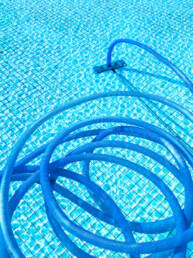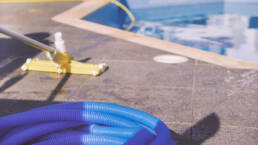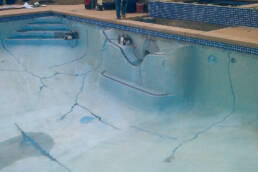As the days get longer and temperatures start to climb, it’s time to prepare your pool for another season of fun in the sun. Whether you’re a seasoned pool owner or new to the joys of pool maintenance, Laguna Pools is here to help you get your pool ready for summer. Located in the Denver area, we understand the unique challenges our climate can present, and we’re committed to making sure your pool is in top shape for the months ahead.
Step-by-Step Guide to Summer-Ready Pool Preparation
Step 1: Spring Cleaning – Start Fresh
After a long winter, your pool needs a thorough cleaning to remove debris and any algae buildup. Here’s a detailed breakdown to ensure your pool is sparkling clean:
Remove Debris
Start by removing large debris that may have accumulated over the winter:
- Surface Cleaning: Use a pool skimmer or leaf rake to remove floating leaves, twigs, and other debris from the water’s surface. Make sure to skim the entire pool, paying special attention to corners and areas near steps or ladders where debris can collect.
- Skimmer Baskets: Empty the skimmer baskets regularly as you clean the surface. This helps maintain optimal water flow and prevents clogs in the filtration system.
Vacuum the Pool
Next, it’s time to clean the pool floor and walls:
- Manual Vacuum: For a thorough clean, use a manual pool vacuum. Attach the vacuum head to a telescoping pole and connect it to the skimmer using a vacuum hose. Move the vacuum slowly across the pool floor, overlapping each pass to ensure you don’t miss any spots.
- Automatic Cleaner: Alternatively, you can use an automatic pool cleaner. These devices save time and effort, as they can navigate the pool on their own, scrubbing and vacuuming as they go.
Brush the Walls and Floor
Brushing the walls and floor helps remove algae, dirt, and stains that the vacuum may miss:
- Pool Brush: Use a pool brush with nylon or stainless steel bristles, depending on your pool’s surface material. For plaster or concrete pools, stainless steel brushes work best, while nylon brushes are suitable for vinyl or fiberglass pools.
- Technique: Start at the top of the walls and work your way down, using firm, sweeping motions. Pay extra attention to areas with visible algae or discoloration.
Step 2: Check the Equipment
Winter can take a toll on your pool equipment. Inspect everything to ensure it’s in working order:
Pump and Filter
Your pool’s pump and filter are essential for maintaining clean water:
- Pump Inspection: Check the pump housing for cracks or leaks. Make sure the pump lid and O-ring are intact and lubricated to ensure a good seal. Listen for any unusual noises that might indicate mechanical issues.
- Filter Maintenance: Depending on your filter type (sand, cartridge, or diatomaceous earth), the maintenance steps will vary:
- Sand Filter: Backwash the filter to clean out trapped debris. If the sand hasn’t been replaced in the past 3-5 years, consider changing it.
- Cartridge Filter: Remove the cartridges and hose them off thoroughly. For a deeper clean, soak them in a filter cleaning solution. Replace the cartridges if they show signs of wear and tear.
- Diatomaceous Earth (DE) Filter: Backwash the filter and add new DE powder according to the manufacturer’s instructions. Inspect the filter grids for any damage and replace if necessary.
Heater
If you have a pool heater, ensuring it’s functioning properly is crucial, especially in Denver’s cooler spring months:
- Visual Inspection: Look for signs of rust, corrosion, or damage on the heater’s exterior and components.
- Operational Test: Turn on the heater and set it to your desired temperature. Ensure it ignites correctly and heats the water efficiently. If you notice any issues, such as not reaching the set temperature or unusual noises, it may need servicing by a professional.
Pool Lights
Functional pool lights enhance safety and ambiance for evening swims:
- Check for Damage: Inspect the light fixtures for cracks or water intrusion. Make sure the electrical connections are secure and free of corrosion.
- Replace Bulbs: If any bulbs are burnt out, replace them with the appropriate wattage and type specified for your pool lights. Always follow safety protocols when working with electrical components near water.
By thoroughly cleaning your pool and inspecting the equipment, you’ll ensure a smooth and enjoyable swimming season. These detailed steps will help you maintain a pristine pool and extend the lifespan of your equipment. If you need assistance, don’t hesitate to contact Laguna Pools for professional cleaning and maintenance services tailored to the Denver climate.
Step 3: Balance the Water Chemistry
Proper water chemistry is crucial for a safe and enjoyable swimming experience. It ensures that your pool is free of harmful bacteria, algae, and other contaminants, while also preventing damage to your pool and equipment. Here’s how to get your pool water balanced:
Test the Water
Use a reliable pool water testing kit or test strips to check the following key parameters:
- pH Levels: The pH level measures how acidic or basic your pool water is. The ideal range is between 7.4 and 7.6. Water that is too acidic (low pH) can corrode pool surfaces and equipment, while water that is too basic (high pH) can lead to scaling and cloudy water.
- Chlorine Levels: Chlorine is essential for killing bacteria and algae. The recommended chlorine level is between 1 and 3 ppm (parts per million). Insufficient chlorine can lead to algae growth and unsafe water, while too much chlorine can irritate the skin and eyes.
- Alkalinity: Total alkalinity helps buffer the pH level, keeping it stable. The ideal range for alkalinity is 80 to 120 ppm. Low alkalinity can cause pH fluctuations, while high alkalinity can make it difficult to adjust the pH.
- Calcium Hardness: Calcium hardness measures the level of calcium in the water. The ideal range is 200 to 400 ppm. Low calcium levels can lead to the erosion of pool surfaces, while high levels can cause scaling and cloudy water.
Adjust Chemicals
Based on your test results, you may need to add chemicals to balance the water:
- pH Adjusters: If the pH is too low, add a pH increaser (sodium carbonate or soda ash). If the pH is too high, add a pH decreaser (sodium bisulfate or muriatic acid).
- Chlorine: To increase chlorine levels, add chlorine granules, tablets, or liquid chlorine. To decrease chlorine levels, you may need to partially drain and refill the pool with fresh water or use a chlorine neutralizer.
- Alkalinity Adjusters: To raise alkalinity, add an alkalinity increaser (sodium bicarbonate). To lower alkalinity, add a small amount of muriatic acid, added slowly and in a well-distributed manner.
- Calcium Hardness Adjusters: To increase calcium hardness, add calcium chloride. To decrease calcium hardness, partially drain and refill the pool with softer water.
Shock the Pool
Shocking the pool involves adding a high dose of chlorine to eliminate contaminants and clear up cloudy water:
- When to Shock: Shock your pool at the beginning of the season, after heavy use, or when you notice water quality issues such as cloudiness or algae growth.
- How to Shock: Follow the manufacturer’s instructions for the shock treatment product you are using. Dissolve the shock granules in a bucket of water before adding them to the pool, and run the pump for several hours to distribute the chlorine evenly.
Step 4: Inspect Pool Safety Features
Safety should always be a priority when preparing your pool for the summer. Ensuring that your pool’s safety features are in good condition can prevent accidents and provide peace of mind for you and your family. Here’s what to inspect:
Fencing and Gates
A secure fence and gate system is the first line of defense in pool safety:
- Check for Damage: Inspect your pool fence for any signs of wear, damage, or gaps that could allow children or pets to enter the pool area unsupervised. Ensure that the fence height complies with local regulations.
- Gate Functionality: Ensure that all gates are self-closing and self-latching. The latch should be out of reach of small children. Test the gate several times to ensure it closes and latches securely every time.
Safety Covers and Alarms
These devices add an extra layer of protection:
- Safety Covers: If your pool has a safety cover, check for any tears, wear, or broken anchors. Make sure the cover is properly installed and securely fastened when not in use.
- Pool Alarms: If you use pool alarms (which alert you when someone enters the pool area), test them to ensure they are functioning correctly. Replace batteries as needed and confirm that the sensors and alarms are in good working order.
Step 5: Regular Maintenance
Keeping your pool in great shape all summer long requires regular maintenance:
- Weekly Cleaning: Skim, vacuum, and brush your pool weekly to keep it clean and clear.
- Water Testing: Test and adjust your pool’s water chemistry weekly.
- Monitor Equipment: Regularly check your pool’s equipment for any signs of wear or malfunction.
Trust Laguna Pools for Professional Care
Getting your pool ready for summer can be a daunting task, but you don’t have to do it alone. Laguna Pools offers comprehensive pool maintenance services to help you enjoy a hassle-free summer. Our team of experts is dedicated to providing top-notch service to pool owners in the Denver area, ensuring your pool is always in pristine condition.
From opening your pool in the spring to regular maintenance and repairs, Laguna Pools has you covered. Contact us today to schedule your pool opening service and let us take the stress out of pool maintenance. Here’s to a summer filled with crystal-clear water, sunny days, and endless fun in your beautifully maintained pool!

Ready for an expert opinion? Get in touch today!
Laguna Pools is a professional pool and spa contractor that has been servicing the Denver area for over 20 years. We offer routine cleaning and maintenance services, new pool design, construction, and remodeling.
Like this article? Spread the word!
Related Posts
February 10, 2025
Laguna Pools: Denver’s Trusted Pool Builder & Expert Pool & Spa Maintenance Team
Keep your pool in perfect condition year-round with Laguna Pools. From custom pool…
December 20, 2024
Top 10 Trends in Pool Design for 2025
Discover the top 10 pool design trends for 2025, from smart technology to natural pools.…
November 15, 2024
Why You Shouldn’t Neglect Pool Maintenance in Winter: Save Time and Money on Repairs with Laguna Pools
Ensure your pool stays in top shape this winter with expert maintenance from Laguna…





